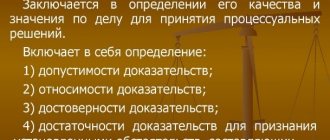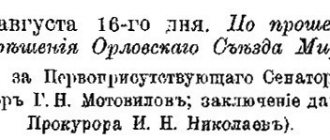The basis of criminal proceedings is the principle of the presumption of innocence. No one can be found guilty of committing a crime until his guilt is proven and determined by a court verdict. This rule is enshrined in the Constitution, provisions and norms of the criminal procedural legislation of the Russian Federation.
In order for the court to find a citizen accused of committing a crime guilty, the investigative authorities must collect and present sufficiently strong evidence to the judges for consideration. Evidence that allows us to reveal all the circumstances of the case includes:
- testimony obtained during interrogations of suspects, interviews with victims, witnesses, confrontations of objects of investigation;
- various objects, documents that served as an instrument, means, or object of the crime and allow us to clarify the overall picture of what happened;
- conclusions of various types of forensic examinations, testimony of independent experts;
- official protocols of criminal procedural activities carried out.
Inadmissible evidence in criminal proceedings
All evidence provided to the court must be collected legally in accordance with the requirements and standards approved by the Code of Criminal Procedure of the Russian Federation. Inadmissible evidence collected in violation of the law will not have legal force, i.e. the court will not accept them as the basis for the accusation.
General definition of inadmissible evidence
Evidence provided by investigative authorities may be considered inadmissible by judicial authorities if the norms established by law were violated in relation to their source or during collection. The Constitution of the Russian Federation directly prohibits the use in legal proceedings of evidence that was obtained and collected in violation of the laws (Article 50). This constitutional norm is determined in more detail by the provisions of a number of articles of the Code of Criminal Procedure.
You cannot use evidence that was obtained in violation of the law.
According to criminal law, such groups of inadmissible evidence can be distinguished.
- Testimony that was taken during pre-trial interrogations of persons suspected of committing crimes in the absence of a lawyer, including cases when the interrogated persons refuse a lawyer. Information that the accused refused to confirm during the trial is also considered inadmissible.
- Information based on assumptions, conjectures, and rumors obtained from interviews with witnesses and victims in the case under investigation. Information in which the interviewed persons were unable to indicate reliable sources of their information is also unacceptable.
- Other evidence collected in violation of established norms and requirements of the criminal procedure code.
Evidence cannot be based on assumptions, conjectures, etc.
As you can see, the legislation leaves open the list of evidence that may be considered inadmissible in court.
Important! When considering evidence, judicial authorities in each specific case must determine the legality of their receipt and compliance with the requirements of criminal law.
Sources related to inappropriate
Data during the investigation is collected from various sources, which are:
- a person against whom a criminal case is being initiated;
- a person whose rights have been violated or harm to health or property has been caused;
- a person who acts as a witness in a case under investigation.
A priori, these sources are reliable unless proven otherwise. During the investigation, it may become clear that the information received from the source cannot be used in further investigation, since the source was found to be inappropriate.
Such sources include:
- persons who are not responsible for their words and actions due to a mental disorder or physical characteristics of the body;
- a person who refuses to name his informant;
- information received from minors and minor witnesses in the absence of a teacher or legal representative;
- the interrogated person was not warned about his refusal to testify against his family and friends;
- a person who was initially involved in the case as a suspect, and later interrogated as a witness;
- a citizen whose identity has not been verified.
Even if these sources contain important information that helps solve the case, their information has no legal force in court. The legislator classifies as improper sources documents certified by a notary, but not recorded in the investigation protocol.
The prosecution and defense should not rely on information received from the above persons. A defense or prosecution based on these facts will not be accepted by the court.
The presiding officer may not accept the results obtained during his research if the expert:
- incompetent in the issue under study;
- added his opinion to the results;
- the expert was not informed that responsibility for drawing up a false act would apply;
- participated in the case in the early stages as a consultant and has his own interest in the outcome of the case.
Even if the expert’s opinion is decisive in court, but it is drawn up in violation of the established rules, then this opinion is rejected and is not subject to consideration.
Recognition of evidence as inadmissible
Evidence is declared inadmissible in the manner provided for in criminal procedure legislation. First, the grounds must be established that allow the evidence to be declared inadmissible, then a decision is made on the inconsistency of the legality of the evidence provided to the court and on the recognition of such evidence as inadmissible.
The right to petition orally or in writing to have evidence declared inadmissible is vested in the parties participating in the trial, judges, investigators, interrogators, state prosecutors - prosecutors. The conditions, procedure for filing, and deadlines for making a decision on the merits of the petition are regulated by the general rules for considering applications to the bodies of inquiry and judicial proceedings. The adopted resolution must be motivated and contain the grounds for refusing or satisfying the petition.
Parties participating in the trial may petition to have evidence declared inadmissible.
Evidence collected during the pre-trial investigation that is declared inadmissible has no legal force. They cannot form the basis of an accusation or serve as a basis for proving individual circumstances of the case.
Important! However, during the trial, one of the parties has the right to petition for a review of the illegality of the excluded evidence and recognition of it as admissible.
The concept of evidence in criminal proceedings
Therefore, before presenting evidence to the presiding officer, the prosecution and defense are obliged to make sure that the facts were obtained by legal means and document this. Evidence is data, objects, documents with the help of which the investigating authorities establish whether an unlawful act was committed or not. Using this data, investigators, the prosecutor and the presiding judge determine the guilt of the suspect, and subsequently the accused and the defendant.
The role of such data is important, without them it is impossible to investigate a criminal case. Based on them, the parties prove or disprove the guilt of the defendant. Therefore, it is important to take the collected data seriously and obtain it in a legal way. There should be no violations of current legislation when collecting facts, objects and documents necessary to establish the truth.
Data is divided into two types:
- acceptable;
- unacceptable.
This classification is proposed by the Criminal Procedure Legislation, taking as a basis the principle of legality in criminal proceedings. According to this principle, investigative bodies, investigators, prosecutors, judges, and other officials must strictly follow the norms enshrined in the Constitution of the Russian Federation and the Code of Criminal Procedure of the Russian Federation, without violating them.
Category of appropriate sources of evidence
One of the main conditions for determining whether evidence is admissible or inadmissible is the reliability of the information obtained as a result of the investigation. At the same time, the law defines the following circle of persons who are appropriate sources of evidence. Let's list who belongs to them.
- Direct participants are victims, suspects, accused, as well as witnesses to the crime or individual circumstances related to the case.
- Employees of crime investigation bodies, as well as other persons involved in drawing up protocols of investigative activities - investigators, witnesses, representatives of expert groups.
- Participants in court proceedings are civil plaintiffs, defendants, and their representatives.
- Individuals, legal entities, government organizations providing various types of supporting documentation that was used in the investigation.
- Citizens who presented to the investigative authorities objects that have signs of physical evidence in this case.
A certain circle of people is an appropriate source of evidence
There is a point of view that sources of evidence may include procedural forms of evidence - protocols, expert opinions, reports, testimony, documents, physical evidence. However, Article 75 of the Code of Criminal Procedure defines as inadmissible evidence contained in the information of witnesses (that is, individuals) who cannot indicate the primary source of the information they presented.
In accordance with the law, certain admissibility requirements are imposed on sources of evidence, which differ from procedural forms of evidentiary information. The primary source must be a real person - a direct participant or witness of the case under consideration, individual circumstances associated with it, whose identity can be established and verified.
Evidence from unknown, unidentified persons whose information cannot be cross-checked is considered inadmissible. This also includes information obtained as a result of investigative and operational activities from unnamed primary sources who assisted the investigation by investigators on condition of anonymity.
Important! Moreover, such data will be considered unacceptable even if recorded in officially compiled reports by law enforcement officers.
If information from unidentified persons cannot be verified, it is considered inadmissible evidence.
The legislation defines certain categories of citizens and officials who may be participants in an investigation or trial, but will not be considered appropriate sources of evidence because they received information about the circumstances of the case in connection with participation in legal proceedings or as a result of their professional activities. These include:
- judges, jurors of this trial;
- defense attorneys, representatives of the accused who provided legal assistance to a person accused of committing a crime in accordance with a concluded agreement or as assigned by a bar association;
- clergy, regardless of the confession of the accused;
- in the absence of consent - deputies of the State Duma, members of the Federation Council exercising their deputy powers.
Important! Certain conditions for recognition as specific sources of evidence are also imposed on other participants in the process.
Some categories of citizens cannot be considered appropriate sources of evidence
Determining the appropriate subjects for evidence-gathering activities
The norms of criminal procedural legislation define the circle of subjects who are vested with the right to collect and study evidence within the framework of criminal proceedings:
- investigators;
- investigators, other officials of investigative bodies;
- prosecutors;
- lawyers for the accused;
- judges.
The result of the activities of such persons should be precisely different types of evidence. Other participants in the trial are given the opportunity to provide various information, objects, and documents within the framework of the case.
Important! However, all this evidence will be recognized as evidence only if it is added to the collected evidence base of the pre-trial investigation materials by the investigative authorities or by court decision.
The collection and examination of evidence can be carried out by investigators, prosecutors, lawyers, judges
Proper subjects of collection and examination of evidence must comply with certain legal requirements. First of all, in relation to them there are no grounds for disqualification from participation in the process. There are other conditions under which the named participants in the case under investigation will have the rights to collect and examine evidence.
For investigators:
- subject to compliance with the requirements for investigative jurisdiction of the case;
- after an official decision is made to initiate a case or approval of individual decisions to initiate the relevant criminal proceedings;
- in cases of a separate assignment from investigators of another territorial jurisdiction;
- when included in an investigative group created by decision of the prosecutor's office to carry out preliminary investigative measures.
Once a formal decision has been made to initiate a case, investigators can begin collecting evidence.
Similar conditions apply to investigators for recognizing them as proper subjects of evidence collection. At the same time, inquiries should be carried out as independent forms of pre-trial preliminary investigation.
Important! Persons who, within the framework of the same criminal case, have carried out or are carrying out actions of an operational investigative nature cannot be allowed to carry out investigative activities.
For other officials of the investigative bodies:
- in cases where there are grounds for urgent investigative measures;
- if the investigator or prosecutor has given a written order about the need to carry out certain investigative measures by employees of the investigative bodies;
- the protocols of investigative measures included appropriate notes on the possibility of involving representatives of the investigative bodies to carry out actions of an operational investigative nature.
Persons who, within the framework of the same criminal case, carry out operational investigative actions cannot conduct an inquiry.
For prosecutors:
- after the official acceptance of this criminal case;
- in cases of personal participation in the preliminary investigation, its individual stages or activities.
For judges:
- in cases of compliance with legal requirements on the jurisdiction of cases;
- after the official receipt of the case for consideration with appropriate distribution by the chairman or collegial body of the court.
The following methods are provided for lawyers to collect admissible evidence:
- by collecting documents, objects, information that relate to the circumstances of this criminal proceeding;
- through surveys of participants in the case under consideration on the basis of their voluntary consent;
- by collecting characteristics related to the case, various certificates, and other documentation.
Lawyers can interview participants in the case under consideration, collect documents, items related to the crime, etc.
Important! Lawyers acquire the authority to collect admissible evidence after concluding appropriate agreements with the client or in the event of being appointed as a defense attorney in a given trial.
Requirements for choosing the appropriate method of collecting evidence
In certain situations, evidentiary materials may be considered inadmissible if the investigative authorities have chosen a method of action to obtain information that is inconsistent in its content with the legal procedural requirements in a given criminal case. Arbitrary replacement of types of evidence collection is illegal, which becomes the basis for the loss of legal force of evidence collected in this way.
For clarity, the following examples can be given:
- replacing the need to present physical evidence or persons for identification with interrogations or confrontations;
- replacing inspections with searches;
- replacing seizures of property with seizures;
- replacement of additional examinations with interrogation of experts or specialists.
Collection of evidence must follow established rules
Each stage of the investigation and individual investigative measures must be structured and carried out in such a way as to ensure the maximum possible reliability of the information collected.
Important! Information obtained in an inappropriate manner during the investigation of the case will become the basis for doubts by the judicial authorities and jurors as to their correspondence to reality. The choice of the type of each investigative action must be determined by the goals established by law.
What violations lead to inadmissibility of evidence?
Based on the wording of Art. 75 of the Code of Criminal Procedure of the Russian Federation, the nature and extent of the violation of procedural law does not matter.
The violation must concern the procedure for obtaining specific evidence when performing a specific procedural (investigative action):
- Testimony of a victim, witness, suspect, or accused is obtained during the interrogation of a person having a certain procedural status, as well as during an investigative experiment, verification of testimony on the spot or a confrontation. In each case, the interrogation or other form of testimony must proceed in compliance with established requirements. Thus, in particular, an explanation of rights and obligations is mandatory. In some cases, when obtaining testimony, the participation of other persons is required, for example, a teacher, legal representative, translator, defense lawyer. Violation of the requirements of the Code of Criminal Procedure of the Russian Federation when obtaining testimony is grounds for recognizing the testimony as inadmissible evidence. It will also be a violation to interrogate a person who does not actually correspond to the procedural status in which he is interrogated. This basis often includes situations where a suspect is actually interrogated by a witness, although he should be interrogated precisely as a suspect.
- Violations related to obtaining material evidence are often committed. This includes, first of all, objects and documents related to the crime that can help in its detection or establishment of the circumstances of the crime. As a rule, material evidence is obtained (seized) during an inspection of the crime scene, search, seizure, investigative experiment, and less often during other investigative actions. The receipt of material evidence must be checked for compliance with the requirements of the Code of Criminal Procedure established for the investigative (procedural) action in which the evidence was received.
- An expert’s opinion is the most difficult evidence in terms of assessing its admissibility/inadmissibility. Here, sometimes it is necessary to analyze and evaluate the entire process of conducting an examination - from obtaining materials for research and ordering an examination to carrying out the research and preparing a conclusion. In addition, it should be borne in mind that if the evidence submitted for research is considered unacceptable, then the conclusion is automatically called into question regarding admissibility. Other possible grounds for inadmissibility of an expert’s opinion include:
- information calling into question the professional level of the expert, his competence, objectivity, independence and other qualities required for an expert;
- violations of the Code of Criminal Procedure when ordering an examination (making a decision and familiarizing the participants in the process with it);
- violations of the Code of Criminal Procedure and other regulations during the conduct of research, including violations related to expert activities.
- Protocols of investigative and judicial actions. Not many people know that these documents themselves are evidence and must meet certain requirements for drafting and execution. However, violations and mistakes are often made here. Sometimes they forget to put the date or time, or they put it in, but it’s wrong. Often a signature is missing in one place or another. Since many protocols today are printed (filled out) on a computer, technical errors, omissions of columns, leaving old records from previous protocols, etc. cannot be ruled out.
- Results of operational investigative activities (ORA) and operational investigative measures (ORM). It must be said right away that the results of operational investigations and operational investigations are not in themselves evidence in criminal cases and cannot be included just like that. They are not included in the list of evidence in a criminal case, which is determined by Art. 74 Code of Criminal Procedure. Due to the incorrect approaches of investigators and interrogators to the rules for introducing operational and operational activities, a large number of mistakes are made. Moreover, very often it is on the results of such activities that both the prosecution and the entire evidentiary block are based. In order for the results of an operational investigation and operational investigation to receive the status of evidence, they must be:
- checked for legality of receipt within the framework of the relevant ORM;
- examined with the drawing up of a protocol and, if necessary, with the use of technical means and the participation of a specialist (expert);
- examined, if necessary, within the framework of an appropriate examination for authenticity and absence of distortions (damages);
- attached to the case as documents or material evidence - depending on what criteria they meet.
Often, violations of the law are obvious and do not require much effort to identify them. Their main reasons are the low professional level of operational workers, investigators and interrogators, inattention or negligence on their part. But there are also controversial situations. As a rule, disputes flare up where evidence is of particular importance to the case and not everything went smoothly when it was received.
The most frequently questioned are:
- expert opinions;
- results of searches and seizures;
- ORM results;
- a chain of interconnected evidence on which the accusation is based.
Legality of procedural forms of collecting evidentiary information
The procedural forms of actions taken to collect evidence must strictly comply with the standards enshrined in the Code of Criminal Procedure of the Russian Federation. For example, it is unacceptable to conduct searches before the official initiation of a criminal case or without a preliminary issued order to carry out such investigative measures.
Failure to comply with the legality of procedural actions, conditions, guarantees during the collection of information necessary for the investigation leads to a significant violation of the interests and rights of participants in such procedural activities. At the same time, the court and jurors will have insurmountable doubts about the reliability of the evidentiary materials presented for consideration.
Important! As a result, if the legality of the procedural registration is not observed, the information obtained will be classified as unacceptable, even if its sources and methods of collection comply with the legal requirements.
It is unacceptable to conduct searches before the official initiation of a criminal case
Requirements for the procedure for determining the admissibility of evidence
There is an opinion that literally every violation of procedural norms, any deviation from the action prescribed by law to collect evidence or verify the information received subsequently leads to the recognition of the information presented to the court as inadmissible. In reality, this occurs due to systemic non-compliance with the Code of Criminal Procedure, and not its individual provisions.
Recognition of the inadmissibility of collected evidence is possible in situations where deviations from the requirements of the law led to a violation of the basic principles of judicial independence and equality of parties in adversarial proceedings.
Important! If the law provides for a way to neutralize the consequences of such violations and these means have been used and the feasibility of their use has been proven, then the collected evidence base will be considered admissible for consideration.
If evidence collection activities involved a violation of the law, such evidence will be considered inadmissible
As an example, we can cite a situation where investigators did not warn a witness about his right not to testify against himself or his loved ones. Overall, this is a serious departure from procedural rules. But if the witness confirms the voluntary nature of giving evidence, the consequences of such a violation are not irremovable, they do not affect the principle of equality of parties to the trial. Accordingly, information obtained in this way must be considered admissible for use in court.
Evidence obtained with deviations from procedural norms, the consequences of which cannot be neutralized, will be considered legally void. For example, interrogation using torture will lead to a gross violation of rights and a violation of the equality of the parties in the adversarial process.
Important! As a result, this will entail the recognition of the inadmissibility of the evidentiary materials collected in this way.
It is also necessary to take into account that not all deviations from the requirements of the Code of Criminal Procedure, including fatal ones, are significant for the collection and verification of evidence. For example, the presence of persons under the age of sixteen in the courtroom during the trial, or the summoning of witnesses for questioning through a telephone call rather than an official subpoena, are violations of procedural rules, but in no way affect the procedure for obtaining evidence. Such non-compliance with the provisions of the Code of Criminal Procedure may lead to disciplinary penalties for violators, but should not affect the determination of the admissibility of evidence.
Not all deviations from the requirements of the Code of Criminal Procedure, including fatal ones, are significant for the collection and verification of evidence
Commentary on Article 75 of the Code of Criminal Procedure of the Russian Federation
1. Admissibility is the compliance of evidence with the requirements of criminal procedural law, i.e. whether it has due process. Deviation from this form may lead to the inadmissibility of evidence, i.e. deprivation of its legal force and impossibility of using it in the process of proof. In part 1 room. article, the inadmissibility of evidence is associated with a violation only of the requirements of the Code of Criminal Procedure itself, however, according to Part 2 of Art. 50 of the Constitution of the Russian Federation “in the administration of justice, the use of evidence obtained in violation of federal law is not permitted.” The Constitution, therefore, recognizes as inadmissible evidence collected by subjects of evidence in violation of any federal law, and not just the Code of Criminal Procedure. In the event of a conflict, a constitutional norm has an advantage over an industry norm, therefore Part 1 of Art. 75 of the Code of Criminal Procedure should, in our opinion, be interpreted broadly - in accordance with the text of the Constitution of the Russian Federation. Otherwise, evidence obtained by the investigative body, for example, as a result of illegal operational-search activities and formalized in external compliance with the criminal procedural form, could be considered admissible. For example, operational employees of the investigative agency carried out a test purchase of a narcotic substance with subsequent entry into a home against the will of the persons living there without obtaining prior permission from the court, despite the fact that this is required by Part 2 of Art. 8 Federal Law “On operational investigative activities”. If the narcotic substance obtained during such a purchase and the banknotes found on the seller were examined in compliance with procedural rules, then in the literal sense the com. Articles of the Code of Criminal Procedure, they should have been recognized as admissible evidence, since the requirements of this Code were not formally violated. However, this contradicts the Federal Law “On Operational-Investigative Activities” and the Constitution of the Russian Federation, therefore evidence collected in this way is actually unacceptable. Otherwise, it may lead to the replacement of procedural actions with operational investigative ones for the purpose of illegally obtaining future evidence, when the procedural form is used as a “screen” for violating the constitutional rights of an individual.
The same problem arises in connection with the use of equipment, tools, devices and techniques by specialists and experts. According to Part 1 of Art. 13 of the Law of the Russian Federation of April 27, 1993 N 4871-1 “On ensuring the uniformity of measurements” state metrological control and supervision, carried out to verify compliance with metrological rules and norms, apply, in particular, to measurements carried out on behalf of the court, prosecutor’s office, arbitration court, government bodies of the Russian Federation. That is, expert methods and equipment associated with any measurements must comply with the requirements of state standards in the field of measurements, and measuring instruments and other equipment used by specialists and experts during investigative actions must be certified. Violation of these requirements should entail the recognition of the evidence obtained as inadmissible.
2. In part two com. The article provides an open list of cases when evidence should be declared inadmissible. Thus, inadmissible evidence includes the testimony of a suspect or accused given during pre-trial proceedings in a criminal case in the absence of a defense lawyer and not confirmed by him in court (clause 1, part 2, article 75). This provision serves as an important guarantee against self-incrimination and admission of guilt by the accused and suspect under the influence of physical or mental violence, the use of which, thanks to this norm, practically loses all meaning. It is noteworthy that the condition of the absence of a defense attorney also includes the refusal of a defense attorney by the accused or suspect himself. In this way, a barrier is put in place to the attempts of unscrupulous investigators and investigators to persuade the accused and suspect to formally voluntarily refuse a defense lawyer, which is usually followed by a forced refusal of a defense lawyer or an illegal attempt to “exchange” confessions to alleviate the situation of the accused or suspect (a promise not to use preventive measures, detention, assistance in terminating criminal prosecution, etc.). At the same time, it is prohibited to reproduce the testimony of a suspect, accused, given during pre-trial proceedings in a criminal case in the absence of a defense lawyer and not confirmed by him in court, by interrogation as a witness, interrogator or investigator who carried out the inquiry or preliminary investigation <1>.
——————————— <1> See: Determination of the Constitutional Court of the Russian Federation dated 02/06/2004 N 44-O on the complaint of gr. Demyanenko V.N. for violation of his constitutional rights by the provisions of Articles 56, 246, 278 and 355 of the Code of Criminal Procedure of the Russian Federation // RG. 04/07/2004. N 71.
Judicial practice broadly interprets the norm of Part 2 of Article 75 of the Code of Criminal Procedure of the Russian Federation, extending it to cases of absence of a teacher or psychologist when receiving testimony, when his participation by force of law (Article 425 of the Code of Criminal Procedure of the Russian Federation) was mandatory <1>.
——————————— <1> See: paragraph 9 of the Resolution of the Plenum of the Supreme Court of the Russian Federation dated 01.02.2011 N 1 “On the judicial practice of applying legislation regulating the specifics of criminal liability and punishment of minors” // Bulletin of the Supreme Court of the Russian Federation . 2011. N 4.
3. In paragraph 2 of part 2 com. The article confirms the prohibition on the testimony of a victim or witness if it is based on a guess, assumption, rumor, as well as the testimony of a witness who cannot indicate the source of his knowledge. At the same time, unlike the testimony of a witness, the legislator did not consider it necessary to declare the testimony of the victim inadmissible if he cannot indicate the source of his knowledge. Actually, testimony without reference to a source of knowledge is testimony “by hearsay.” In our opinion, in this case there is a gap in legal regulation. Taking into account the general principle of direct examination of evidence, which prohibits the use of data whose original source is unknown, it should be concluded that in fact the legislator, in relation to the testimony of the victim, should have had in mind the same restriction on the use of hearing testimony as in relation to the witness. Therefore, it seems that this prohibition, by analogy with the law, is lawfully extended to the testimony of the victim.
Guesses and assumptions on which it is prohibited to base the testimony of a witness are logical conclusions that the witness makes from any facts known to him. However, they cannot have direct evidentiary value, because only information about facts, but not conclusions drawn from them, are considered evidence. The latter relate to the content of the assessment of evidence, which, according to the law, only judges, jurors, as well as the prosecutor, investigator, and interrogator are authorized to do (Part 1 of Article 17). Information provided by a witness that has a probabilistic form should be distinguished from guesses and assumptions: for example, that it seemed to him that there was a knife in the suspect’s hand, although he cannot say this for sure; that the speed of the car he observed was approximately 60 - 70 km per hour, but he finds it difficult to say more precisely, etc. Such data is admissible as evidentiary information, although, like any other, it is subject to critical assessment in conjunction with all other evidence in the case from the point of view of its reliability. On the contrary, if, for example, a witness who appeared at the scene of a traffic accident after the accident claims that, in his opinion, the car was moving along the oncoming lane of the road, since this was indicated by the wheel tracks he saw, then his testimony regarding the movement of the vehicle means in the oncoming lane are only an assumption and do not play an evidentiary role. However, this, in our opinion, does not mean that such information should not be recorded in the investigative protocol at all. Sometimes it can have an important guiding value for building versions and collecting evidence, and in the future it helps to assess the comprehensiveness and completeness of the investigation.
4. According to paragraph 3 of part 2 of this article, all other evidence obtained in violation of the requirements of the Code of Criminal Procedure is also inadmissible. It is often believed that any procedural violation, e.g. deviation from literally any prescription contained in the rules of law concerning the collection and verification of evidence leads to the loss of the quality of admissibility of the information obtained in this way. It should, however, be taken into account that the speech is in com. The article deals with violation of the requirements of the Code as a whole, and not of its individual provisions. If the law provides for means and methods by which it is possible to neutralize the consequences of violation of its individual provisions by proving that they did not affect compliance with the principles of criminal proceedings, then with the successful use of such means and methods it can no longer be said that such evidence was used to prove a violation law. For example, failure to warn a witness about his right not to testify against himself and his loved ones is undoubtedly a very serious procedural violation. However, if it is proven (including by the witness’s own explanations) that this did not in any way affect the voluntariness of the testimony given by him, and therefore the preservation of equality of the parties, the court, it seems to us, has the right to recognize the testimony received as admissible.
Thus, in a criminal case against Ts., his defense lawyer demanded that the protocol of the inspection of the crime scene be declared inadmissible on the grounds that Ts., who was present during the inspection, was not explained his right not to incriminate himself, provided for in Art. 51 of the Constitution of the Russian Federation. The Supreme Court of the Russian Federation recognized the defense lawyer's arguments as untenable due to the fact that Ts. refused to give any explanations, that is, he actually took advantage of a right that was not explained to him <1>.
——————————— <1> See: Cassation ruling of the Investigative Committee according to the UD of the Supreme Court of the Russian Federation dated 08.16.2006 N 7-O06-15.
It cannot be argued that such evidence was used by the court in violation of the law, since it was with the help of the means and methods provided by law that the procedural violation was neutralized. Violations that can be rebutted should, in our opinion, be considered removable, or refutable. On the contrary, if it is established that the distortion of the procedure has led to real damage to the principles of adversarial proceedings, its results in any case should be considered legally void, and the violations committed cannot be eliminated. It is impossible to eliminate, for example, such a violation as obtaining a confession from the accused by subjecting him to torture or cruel, inhuman or degrading treatment. As a result of this violation, the process no longer met the requirements of a fair trial, where the parties should be on an equal footing. It is impossible to compensate justice for such cruel damage. At the same time, not all procedural violations (even fatal ones) committed during the proceedings are significant for obtaining evidence. Thus, the presence in the room where a judicial investigation is taking place of persons under the age of 16 is a procedural violation (Part 6 of Article 241), but is not essential for obtaining evidence, and therefore cannot destroy its admissibility.
5. According to Part 1 of Art. 125 “decisions of the inquirer, investigator, prosecutor to refuse to initiate a criminal case, to terminate a criminal case, as well as their other actions (inaction) and decisions that can cause damage to the constitutional rights and freedoms of participants in criminal proceedings or impede citizens’ access to justice may be appealed to the court at the place where the preliminary investigation was conducted.” In accordance with Part 2 of Art. 50 ch. 2 (“Rights and freedoms of man and citizen”) of the Constitution, the constitutional right is, in particular, the exclusion from the process of evidence obtained in violation of the law. Consequently, illegal actions or inaction of the investigative bodies and the prosecutor, as well as their decisions when obtaining evidence, taken in violation of the law (on inclusion in the case, on forced examination, examination against the will of persons, etc.), can be appealed to the court with requirement to exclude relevant illegally obtained evidence. It seems that the refusal to satisfy requests to collect relevant evidence can also be appealed to the court, since this violates, firstly, the constitutional right (Part 4 of Article 29 of the Constitution) to freely seek information, and secondly, international norms and standards (for example, the right to have adequate opportunities to prepare one’s defense; the right to a confrontation (subparagraphs (b) and (d) of paragraph 3 of Article 6 of the Convention for the Protection of Human Rights and Fundamental Freedoms). It should be noted, however, that in Currently, judicial practice, unfortunately, as a rule, rejects such a literal interpretation of these norms.See about this.com to Article 125 of this Code.
6. According to Part 3 of Art. 14 all doubts about the guilt of the accused, which cannot be eliminated in the manner established by this Code, shall be interpreted in favor of the accused. In our opinion, this rule also applies to the interpretation of doubts regarding the admissibility of evidence. Thus, if an investigator, prosecutor, inquiry officer, or court received evidence exonerating the accused in violation of the legal order, it, at the request of the defense, must be declared admissible, because in any case it raises certain doubts about the guilt of the accused (the so-called asymmetry in the assessment of evidence). The burden of proof in case of errors of the prosecution cannot be placed on the accused. Otherwise, the issue must be resolved when the defense presented evidence that it itself obtained in violation of the law. In these cases, evidence may be declared inadmissible, provided that the violation of the law by the defense is proven beyond a reasonable doubt by the prosecutor. The basis for this conclusion can be not only Part 1 of Art. 75 of the Code of Criminal Procedure, but also a constitutional norm establishing that everyone has the right to freely seek, receive, transmit, produce and distribute information only in a legal way (Part 4 of Article 29 of the Constitution of the Russian Federation). However, the court’s acceptance of such evidence does not exclude its assessment from the point of view of reliability, including taking into account the nature of the violations committed during its collection.
Problems of asymmetry in the application of rules of admissibility of evidence
In judicial practice, there is a problem of asymmetry in the application of the rules of admissibility of collected evidence. The essence of the issue is to determine the varying degrees of legal consequences for the parties involved in legal proceedings - defense attorneys and prosecutors in cases of discovery of a violation committed during the collection of evidentiary information. The provisions of the Code of Criminal Procedure require that all irreducible doubts about the guilt of persons accused of committing crimes be interpreted in their favor.
Important! This rule also applies to the interpretation of the admissibility of the collected evidence - the advantage in this matter should be on the side of the defense.
For example, if procedural deviations in the collection of evidence led to the receipt of information that exonerates the suspect, such materials should be recognized in accordance with the submitted requests of lawyers as admissible for consideration in court. The basis for this is the emergence in such cases of significant doubt about the guilt of the accused person. In general, the consequences of errors made by the investigation during the collection of evidence cannot be assigned to the suspect. However, at the same time, the court must objectively assess the reliability of the information provided by the investigative authorities, all violations of the legality of the procedure for collecting, receiving, and verifying such information.
The court must objectively assess the reliability of the information provided
Otherwise, the rule of asymmetry will be applied in determining the admissibility of evidence of the defense if it was collected with significant violations of the law. If the prosecution proves the illegality of the actions of the defendant’s defenders, the significant and irreparable nature of the consequences of the violations, and the evidentiary materials presented by them will be declared inadmissible.
Important! If the defendant's lawyers obtained alibi evidence from witnesses using the method of threats and intimidation, this will be proven by the prosecution and such exculpatory evidence will be determined to be inadmissible and without legal force.
Persons entitled to collect data
The legislation established a closed list of persons entitled to receive data for the case under investigation.
These individuals include:
- interrogator;
- investigator;
- prosecutor;
- defender;
- court.
Other persons, according to the law, are recognized as improper subjects and do not have the right to search for data. Otherwise, the information received is not included in the case and is not presented in court.
There are precedents recorded in judicial practice when an unauthorized person collected evidence. The presiding officer rejected such data as obtained illegally. If they are received from any party by an official using his position and using threats to the personally interrogated party or his relatives and friends, then such data is also considered void.
Persons who abuse their position during the investigation are subject to punishment according to the Criminal Code.
Legal guarantees for the identification and non-use of inadmissible evidence
The provisions of the Code of Criminal Procedure give persons suspected of committing a crime the right to petition for the recognition of evidence collected by the investigation as inadmissible if there are compelling reasons. Investigators, prosecutors, and interrogators have the right to determine the inadmissibility of evidence materials on their own initiative. Such evidence must be excluded from the indictment or report.
Investigators, prosecutors, and interrogators have the right to determine the inadmissibility of evidence
Any actions or inactions of the prosecutor's office, investigative bodies, for example, refusal to initiate a case, which could lead to a violation of the rights and freedoms of participants in legal proceedings guaranteed by the Constitution or limit their access to fair justice, may serve as grounds for appeal to the court at the place where preliminary investigative actions are being conducted. . The law guarantees the exclusion from judicial proceedings of evidence collected in violation of the law and deemed inadmissible.
Refusals to satisfy a petition to declare the inadmissibility of information obtained illegally can also be appealed in court, since such actions violate the rights given by the Constitution to freely seek and receive information, and international legal norms to fully prepare for protective actions in court.
Criteria for recognizing the evidence under investigation as inadmissible in criminal proceedings
To recognize testimony as incompetent, facts are needed to confirm this.
Such evidence is documents registering the beginning of operational actions before the initiation of a criminal case. Evidence is considered insignificant if:
- it was received by an entity that is not authorized to collect facts and has violated the laws on jurisdiction and jurisdiction. That is, the actions of the subject are not supported and permitted by documents. Permission to conduct operational actions is provided by the investigator and/or prosecutor;
- it was obtained from a source that is not named or not specified in the Code of Criminal Procedure;
- to obtain data, operational activities were carried out in violation of legal norms;
- No investigative actions were taken to collect the facts.
If an examination of the clothing of the alleged culprit of the incident is carried out, although there are no permitting documents for this, then its results are considered insignificant. The legislator clearly states this in federal laws.
The investigator’s task at the stage of collecting information and data is to ensure that all actions of him and his team are carried out without violating the law. Otherwise, everything that is received will not be accepted by the court.










